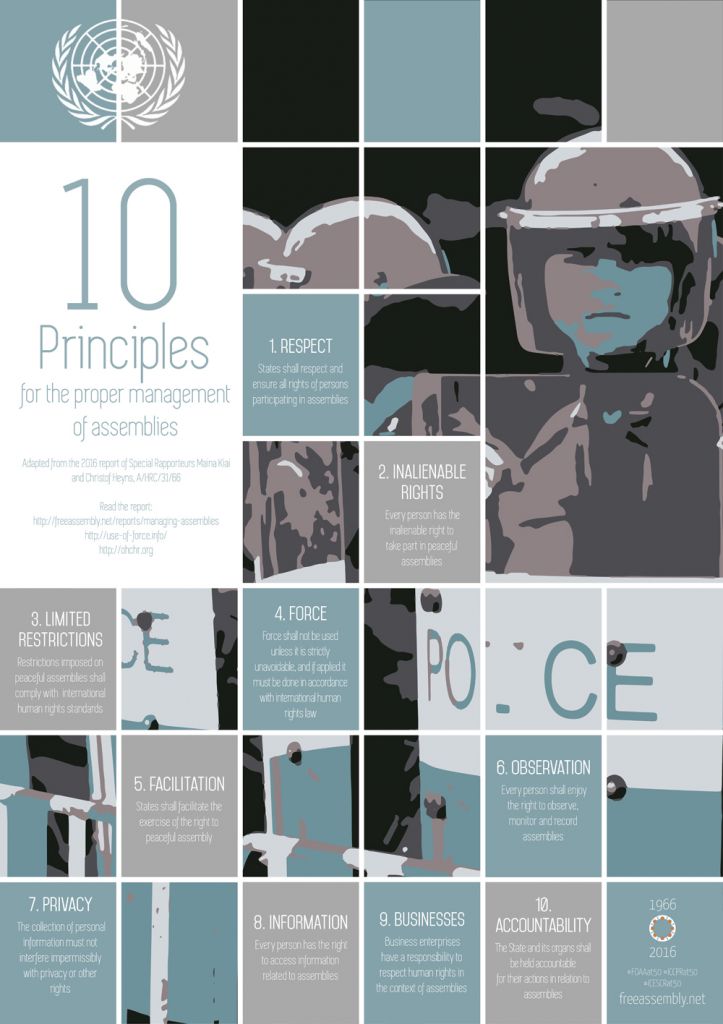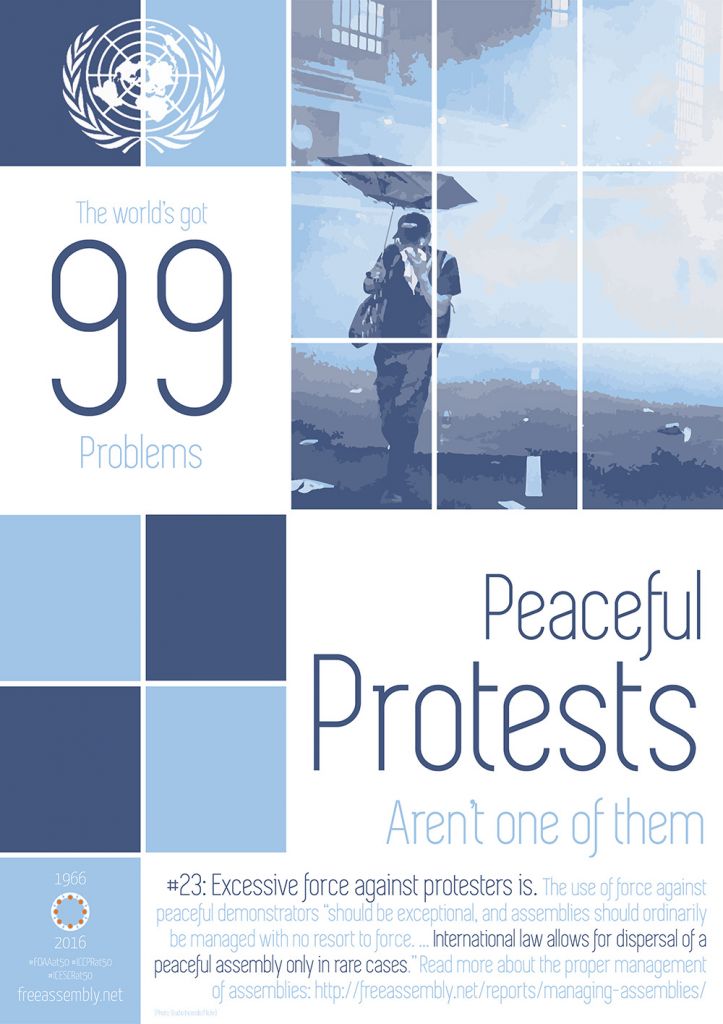Florian Irminger, Head of Advocacy at Human Rights House Foundation, commented: “All parties must make efforts to ensure protests remain peaceful, but this responsibility lies principally with the authorities. While the majority of protestors and civil society promoted non-violent means, the authorities made no such efforts. More than this they took action that provoked and incited violent confrontation, and indiscriminately employed violence against peaceful protestors, journalists, bystanders, and violent elements alike.”
The UN Special Rapporteurs Maina Kiai and Christof Heyns outlined the principles of peaceful protests and issued recommendations on how to manage assemblies and protect the rights of peaceful protestors in their 2016 report.
They stated: “The full and free exercise of the right to freedom of peaceful assembly is possible only where an enabling and safe environment for the general public [exists,] including for civil society and human rights defenders […] A primary function of law enforcement, in addition to the obligation to facilitate, is protecting the safety and rights of those who participate in assemblies, as well as monitors and bystanders.”
The Rapporteurs also clarified that “even if participants in an assembly are not peaceful and as a result forfeit their right to peaceful assembly, they retain all the other rights, subject to the normal limitations.”
In March 2016, the UN Human Rights Council adopted resolution 31/37, encouraging all States to operationalise the Special Rapporteurs’ recommendations into their domestic laws, procedures and practices.

10 Principles for the Proper Management of Assemblies, by Special Rapporteurs Maina Kiai and Christof Heyns
Civil society and protest leaders have promoted non-violent methods and the right to peaceful protest during “Erebuni” events. They have distributed materials with guidance on how protestors could protect themselves without resorting to violence and on the importance of peaceful protest, sought to negotiate with law enforcement to avoid confrontations, and monitored, documented, and raised awareness of instances of violence so that they can be investigated and those responsible held accountable. Further, they are offering support and legal aid to victims.
In contrast, the authorities have used disproportionate forced against peaceful protesters, detaining dozens, and in some cases provoking violent clashes, particularly on 29–30 July.
The Helsinki Citizens’ Assembly Vanadzor, a member NGO of the Human Rights House Yerevan, reported “unprecedented violence by the Republic of Armenia Police against the citizens, illegal and groundless arrests, illegal searches in apartments of civilians and abductions of civilians from the streets.”
The Women’s Resource Centre reported incidents of sexual assault against women protestors. The International Rehabilitation Council for Torture Victims (IRCT) referenced allegations of severe beatings and torture in police custody and during transfer to police stations. News agencies reported attacks on journalists covering the protests.
Attacks and detentions by plain-clothes police officers, as evidenced in video footage, have added to the lack of accountability of law enforcement for their actions, and contributed to a climate of fear in which anyone could seemingly be attacked or detained.
Opposition MPs and protest leaders sought to negotiate with law enforcement, but this was rejected. “Already during the ‘Electric Yerevan’ protests, we witnessed Armenian authorities refusing to negotiate with peaceful protestors and instead ordering law enforcement to use violence,” further commented Florian Irminger. “Authorities must learn to negotiate with protestors in order to use violence as a last resort only.” Neither the President nor the Parliament issued any statements or publicly discussed the protests. To deescalate the situation, and ensure that peaceful protests remain peaceful, as stated by the Ombudsman, “It is necessary that relevant State bodies and public officials intensify their efforts towards eliminating and further preventing all kinds of human rights violations.”
Since the 2008 protests that followed the presidential election of 19 February 2008, violations of the right to freedom of assembly have been a core human rights problem in Armenia, relating to excessive use of force by law enforcement authorities and arbitrary detention.
Armenia committed to supporting the work of human rights defenders in the context of peaceful protests by co-sponsoring the resolution on human rights defenders adopted by the United Nations Human Rights Council in March 2013. The resolution “calls upon States to ensure that human rights defenders can perform their important role in the context of peaceful protests […]and to ensure that no one is subject to excessive or indiscriminate use of force, arbitrary arrest or detention, torture or other cruel, inhuman or degrading treatment or punishment, enforced disappearance, abuse of criminal and civil proceedings or threats of such acts.”
“Armenia cannot simply sponsor what looks good in the United Nations and not implement such commitments back at home,” said Florian Irminger. “It must now take true action, in consultation with independent civil society, to ensure the role of human rights defenders and journalists during protests is protected.”
“Armenian authorities must take responsibility for the violent clashes, facilitate peaceful protests and protect protestors in line with international standards (which they supported), and investigate and prosecute law enforcement officers that used violence against peaceful protestors, journalists, and bystanders,” concluded Florian Irminger.
The Ombudsman has already demanded such a criminal investigation against police officers.
Documents:
- Armenian authorities must stop the disproportionate use of force against protestors
In a joint statement on 4 August 2016, the Human Rights House Network (HRHN) expressed deep concerns about the disproportionate use of force against peaceful protestors, in connection with “Erebuni” protests that began on 17 July. The Armenian authorities must immediately stop the disproportionate use of force against protestors and bring to justice those responsible for the violence.





